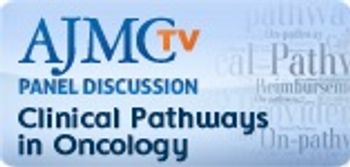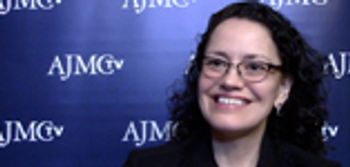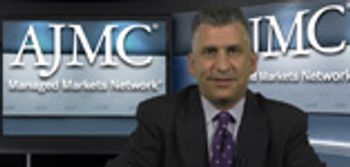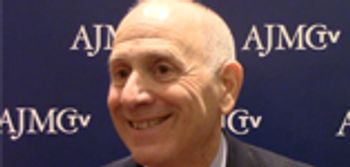
Robert Dubois, MD, PhD, shares findings from their recently published study in The American Journal of Managed Care, which showed that patients do not know they are being treated on predetermined pathways.

Robert Dubois, MD, PhD, shares findings from their recently published study in The American Journal of Managed Care, which showed that patients do not know they are being treated on predetermined pathways.

Neither Blase Polite, MD, MPP, not Robert Dubois, MD, PhD, believe that clinical pathways restrict patient access to care.

According to Blase Polite, MD, MPP, pathways are well-designed to allow personalized medicine.

According to Blase Polite, MD, MPP, it is much harder for a cancer center to adapt care pathways than it is for a smaller clinic.

Expanding the definition of "value" beyond cost, Robert Dubois, MD, PhD, emphasized that clinical pathways need more dynamic quality metrics that provide more than just a snapshot of a patient's performance.

Panelists discussed whether there is any flexibility woven into the process of developing a clinical pathway, especially if a patient does not respond to a particular therapy or if a clinician wants to include a new therapy that may be better fit.

While providers would be relieved of their administrative burden, standardizing care pathways across health plans may not be an easy task, Blase Polite, MD, MPP, explains.

Have clinical pathways in oncology developed enough for providers and patients to use them as a shared decision-making tool? Panelists provide insight.

Experts discuss the need for guidelines and adequate rigor when developing a care pathway in oncology.

What do pathway developers consider as they formulate cancer clinical pathways? Panelists explain.

Panel members provide their own perspective on what clinical pathways encompass.

After beWellnm lost a major state insurer, the exchange changed its enrollment strategy and traveled throughout New Mexico to discuss the change in the market and remind the population about the assistance available, explained Amy Dowd, CEO of beWellnm.

What we're reading, April 25, 2016: Marilyn Tavenner predicts steep Obamacare insurance premium hikes in 2017; the World Health Organization formally begins looking for its new leader; and the life expectancy between rich and poor young Americans narrows.

This week, the top stories in managed care included the news that UnitedHealth will be exiting most Obamacare exchanges in 2017, and coverage from both the annual meeting of the Academy of Managed Care Pharmacy and the Community Oncology Conference.

The state's first-in-the-nation waiver to Medicaid seemed endangered in late 2014, but Governor Asa Hutchinson decided keeping people insured was worth it.

According to Avalere Health, physicians who prescribe lower cost drugs would be reimbursed at a higher rate than those who use more expensive drugs, under the proposed Medicare Part B demo model.

What we're reading, April 21, 2016: Congress keeps things moving on the fight against the opioid epidemic; new paper from the National Bureau of Economic Research finds Medicaid expansion has a broader societal impact; and Novartis faces stiff competition from generic version of Gleevec.

Coverage of sessions held at Cancerscape, the Association of Community Cancer Center’s 42nd annual meeting on policy, value, and quality, held March 2-4, 2016, in Washington, DC.

As healthcare moves to value-based arrangements and delivery models like accountable care organizations (ACOs), the benefit of incorporating a pharmacist can be overlooked. Tina Joseph, PharmD, BCACP, and Reena Jones, PharmD, CPh, both from Nova Southeastern University, outlined how pharmacists can be integrated into ACOs in order to improve care and patient satisfaction, while reducing cost.

A cost-economic analysis by researchers at the Yale School of Public Health has found that switching to Gardasil-9, which protects against 9 oncogenic serotypes of the human papillomavirus, would provide improved health benefits at the same or lower societal cost.

UnitedHealth Group started the year in 34 insurance exchanges, but that number will be a lot less come 2017. CEO Stephen Hemsley announced that the company will only participate in a "handful" of Affordable Care Act exchanges next year.

What we're reading, April 18, 2016: medical experts ask the Joint Commission to revisit its standards of pain management; study determines low-cost generics just as effective at treating hepatitis C as brand name drugs; and UnitedHealth also pulling out of Michigan Obamacare exchange.

An overview of the oncology clinical pathways development program at the UPMC CancerCenter and how it led to the creation of Via Oncology, a clinical pathways vendor.

What we're reading, April 15, 2016: troubling disparities in access to preventive care remain; new test to choose the right hepatitis C medication could save money; and upcoming loss of exclusivity for some drugs could mean big savings for the healthcare system.

Patients encountering high deductibles regarding medication in their Affordable Care Act plans can seek assistance from drug manufacturers by using copay programs, said Daniel J. Klein, president and CEO of the Patient Access Network Foundation.

259 Prospect Plains Rd, Bldg H
Cranbury, NJ 08512
© 2025 MJH Life Sciences®
All rights reserved.
